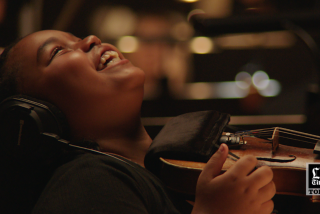Turn It Up
TÊTE-à-TÊTE: Who programs Air Force One? Why, L.A.s own Tena Clark
She’s a rarity in the music industry. Tena Clark has written and produced hits for the likes of Patti LaBelle, LeAnn Rimes, Dionne Warwick and Aretha Franklin; composed music for memorable ad campaigns, like “Have You Had Your Break Today?” for McDonald’s; and amassed a slew of film and television credits. In 1997, she brought her interests under one umbrella when she launched DMI Music & Media Solutions. The business, which specializes in nontraditional distribution, is housed in Pasadena’s original Firehouse and includes a recording studio, an online branding division and a library of prerecorded music for television and film. And her company programs the in-flight music for Air Force One, a role she’s filled since the days of Bill Clinton.
Nic Harcourt: How did music come into your life?
Tena Clark: My mother said even when I was little I was beating on the crib. When I got to junior high, the band director said, “Tena, I’m so tired of hearing you beg me about playing the drumsif you can march 100 yards down and 100 yards back playing the theme from The Pink Panther, I’ll talk your parents into letting you.” So I did exactly what he said, and sure enough, he went to my parents and said, “You gotta let this kid follow her passion.” And they said okay.
NH: How did you begin writing songs?
TC: One of the most brilliant lyricists I ever heard was Hal David. So one dayI was really youngI just called his office and said, “May I speak with Hal David?” When he got on the phone, I almost had a heart attack. I said, “I’m Tena Clark. I’m a drummer and a writer from Mississippi,” and he said, “Well, send me a tape.” I sent him my tape, and he would write and encourage me. Then we kind of lost touch, but years later, I was at a party in Nashville, and all of a sudden this entourage walks in. Everybody was like, “Oh, my God, that’s Hal David.” So I went up to him and said, “Mr. David, I know you won’t remember me,” and I started to tell him who I was, and tears started running down his face. And he went, “Oh, my God!” and explained to his entourage how this little girl tracked him down and started sending him tapes. After that, he would listen to what I was writing, and after about six months, he said, “You’re like a duck outta water here in Nashville. I’ll do anything in the world for you. I want you to come to L.A.”
NH: What was your first big break in L.A.?
TC: My first break out here was to produce the title song for Police Academy 2. From that, I became the music supervisor and wrote most of the original music for Police Academy 3 with Paul Maslansky. Then I started doing a ton of film and television work, like for Twins and Youngblood.
NH: So, obviously, being involved with a couple of hit TV shows and movies opens more doors. How did you start to spread your wings?
TC: Well, after three or four years of television and film, I realized I had these golden handcuffs. I was making a ridiculous amount of money but creatively starving to death. I started pursuing my writing career in the record industry, and then I had my first hit, “Reservations for Two,” with Dionne Warwick and Kashif. And that’s what kind of catapulted me into that end of the business.
NH: How did you make the transition to producer?
TC: The artist Vesta was on A&M. I had used her in a lot of TV and film and commercials, so when she got ready to do her second album on A&M, she came to me and said, “Tena, I want you to produce at least three songs for my new record.” And I just laughed and said, “That’s so sweet, but they’ll never let me.” “Why?” she asked. “They won’t let a woman produce.” She thought that was just ridiculous, so she brought it up with our guy at A&M, who said, “Oh, no, we’ve already got a guy to produce this record.” So she told him, “I’m not doing this record without herI know this woman can produce a hit for me!” Finally, he called her and said, “Okay, you’re really serious, aren’t you?” And then it was basically, like, “You girls, go do your little girlie thing and have a little fun.”
NH: So he wasn’t expecting much, thinking, I’ll let her do her thingshe’ll come back, and then we’ll do it right.
TC: Yeah. Our neck was really on the chopping block. We wrote, and I produced, “Congratulations,” which was a big hit, and all of a sudden I was getting calls to produce.
NH: Your company, DMIwhen did the idea of starting it come about?
TC: I had this little germ of an idea that I wanted to connect consumers to brands through music. And I wanted to sell music everywhere it had not been soldwhich was 99 percent of the worldbecause I didn’t care about Tower Records or Blockbuster. I wanted people to be able to purchase music wherever they werethe Gap, Starbucks, Sears, United Airlines, everywhere. So that was kind of my whole concept when starting the company about 12 years ago. And since then, maybe the platform has changed, but the philosophy has stayed the same. We’re not selling millions of CDs like we were to reach consumers. We’re hitting everything from online promotions to downloads to mobile to the in-store experience. What is critical to us with every one of our brands is to create a music strategy.
NH: Tell me about how you got to program music for Air Force One. You’ve done it for three presidents now.
TC: We got the contract to do the in-flight stuff for United Airlines. I didn’t want to do it at first, and then I thought, Hang on, there’s 100 million people flying around in these cans that I can market totrapped. Maybe that’s a good thing! And then we got this phone call: “And by the way, you’re also doing the music for the president’s plane.”
NH: And this started with President Clinton?
TC: Yeah. We had to know what Clinton’s likes and dislikes werethe president doesn’t just pick up the phone to tell us. So, we programmed from doing a lot of research. With President Clinton being a saxophone player, we had a specific channel on the plane that was just great sax players. Then, unlike Clinton, Bush never gave Rolling Stone interviews relating to his musical tastes. Later on, we learned someone on his staff did program an iPod for him, where I recall there was some Creedence Clearwater on itso we got bits and pieces, and we mostly programmed country and classic rock from then on.
NH: With Barack Obama, I’m guessing you just changed it up entirely?
TC: He’s been so vocal about his music and musical tastes and saying things like, “The kids love the Jonas Brothers.” He talks about how he loves Stevie Wonder, he loves Aretha Franklin. It’s been really special to me, because I wanted President Obama to win so badly. I just produced Aretha, and then to have Aretha at the inauguration and me programming the presidential planeit’s all just kind of full circle. Knowing that he likes old-school music helps a lot. I think, personallyand I’m not just saying this to pat ourselves on the backhe couldn’t have anybody better than us programming his plane.
FACE THE MUSIC
Lila Downs
From Oaxaca, Mexico, and raised in Minnesota and California, Lila shows her musical roots are from both sides of the border, with performances that reflect this unique blend and include everything from brass-band arrangements to Scottish folk songs.
April 9, Royce Hall, Los Angeles
Leonard Cohen
There are plenty of legends who bore us to death with their relentless touring (you know who they are)Leonard Cohen is not one of them. The inimitable poet and songwriter returns to Los Angeles and will no doubt enthrall the audience with his unique style.
April 1011, Nokia Theatre, L.A. Live
Ladytron/The Faint
Two indie faves are hitting the road together for what promises to be one sweaty night out. The glam electronica of Liverpools Ladytron will surely get you dancing, and from Omaha comes the lo-fi punk pop of the Faint. An impressive pairing for the times.
April 2627, Henry Fonda Theater, Los Angeles
NOW HEAR THIS
ARTIST: White Lies
TRACK: Fifty on Our Foreheads
ALBUM: To Lose My Life
Following in the retro footsteps of Bloc Party and Franz Ferdinand, this U.K. import delves a little deeper to weld the dark late-70s goth of Joy Division with the early-80s pop of stalwarts like Echo & the Bunnymen.
For Fans Of: The Teardrop Explodes, The Sound
ARTIST: Coconut Records
TRACK: Saint Jerome
ALBUM: Davy
Before finding success in cool flicks like Rushmore and Marie Antoinette, Jason Schwartzman was the drummer in L.A.s Phantom Planet. This song is from his second solo release as Coconut Records. Its a lovely slice of West Coast pop.
For Fans Of: Rooney, The Beach Boys
ARTIST: Karl Larsson
TRACK: (I Wanna Know) All You Know
ALBUM: Pale as Milk
This song is from a 2006 album I just picked up as a Swedish import. In the tunewhich clocks in at the perfect pop-song length of 2:31the former frontman of Last Days of April poses questions over shimmering guitars and indie pop.
For Fans Of: New Pornographers, Brendan Benson
ARTIST: Like a Fox
TRACK: Internal/External
ALBUM: Wheres My Golden Arm?
Jay Laughlins band balances acoustic guitars with jagged neo-psych rock songs that fit somewhere in between the Band and the Flaming Lips. The music, a blend of rock and electronica, feels both familiar and utterly new.
For Fans Of: Mercury Rev, Sparklehorse
ARTIST: Audrye Sessions
TRACK: Turn Me Off
ALBUM: Audrye Sessions
A lot of bands have echoed Radioheads frenetic prog-rock approach to music, but no one has been able to meld that attitude with the anthemic stylings of U2. Derivative? Maybe. Standing on their own? Yes.
For Fans Of: Muse, Coldplay
More to Read
The biggest entertainment stories
Get our big stories about Hollywood, film, television, music, arts, culture and more right in your inbox as soon as they publish.
You may occasionally receive promotional content from the Los Angeles Times.






